译林高中英语模块一Unit3单元复习课件(29张ppt)
文档属性
| 名称 | 译林高中英语模块一Unit3单元复习课件(29张ppt) |
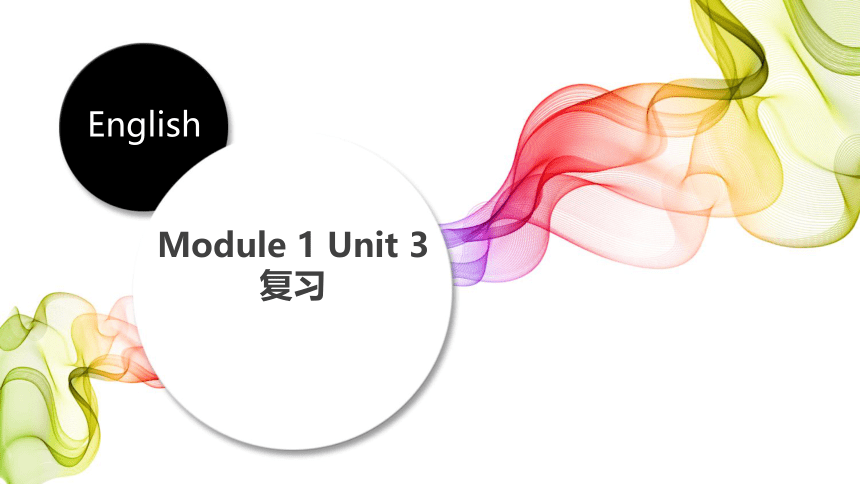
|
|
| 格式 | zip | ||
| 文件大小 | 884.1KB | ||
| 资源类型 | 教案 | ||
| 版本资源 | 牛津译林版 | ||
| 科目 | 英语 | ||
| 更新时间 | 2020-04-08 22:44:42 | ||
图片预览

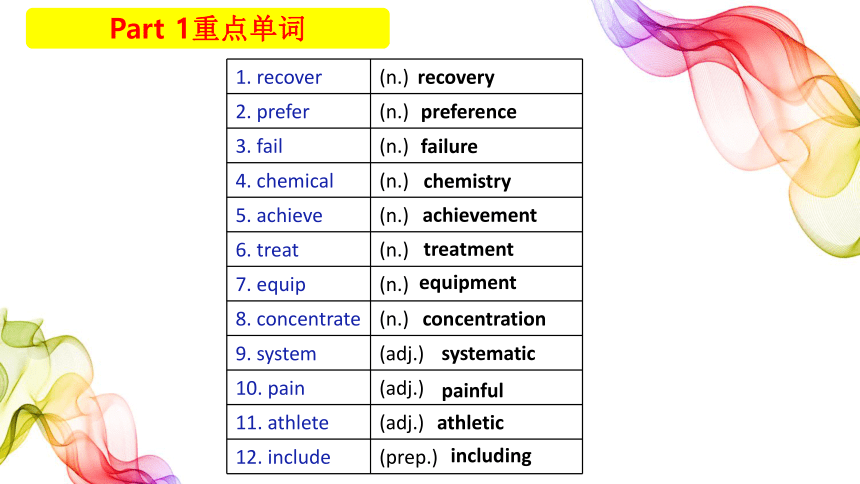
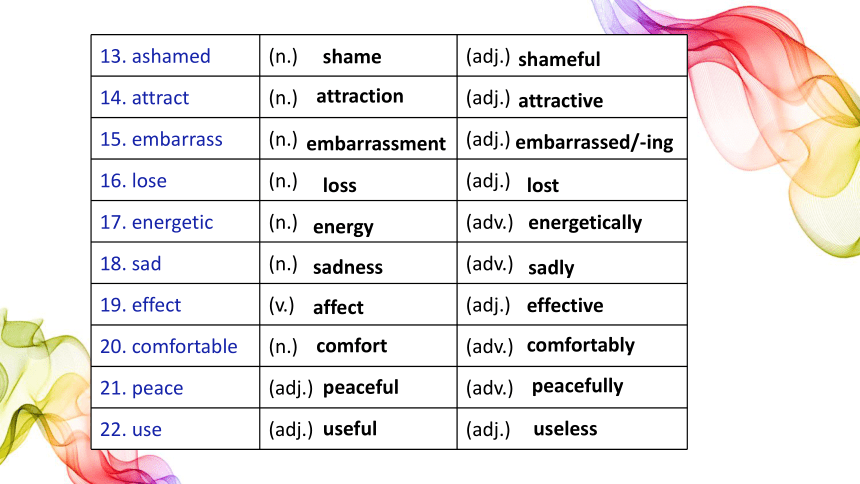
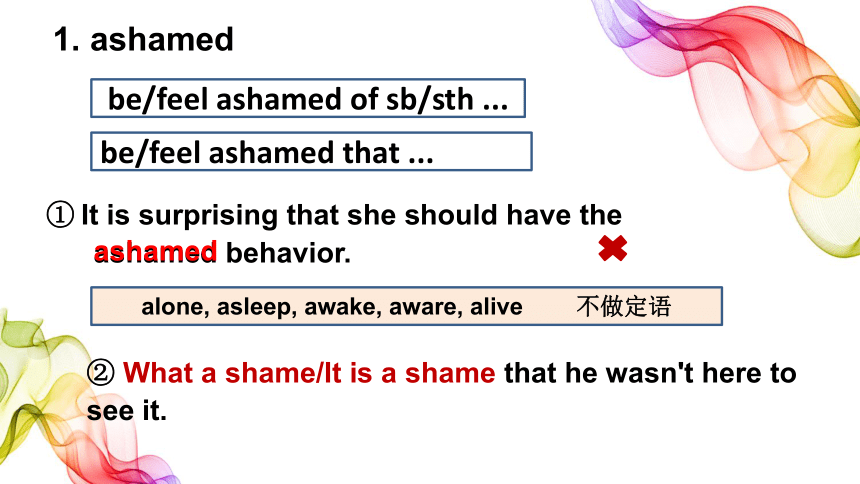
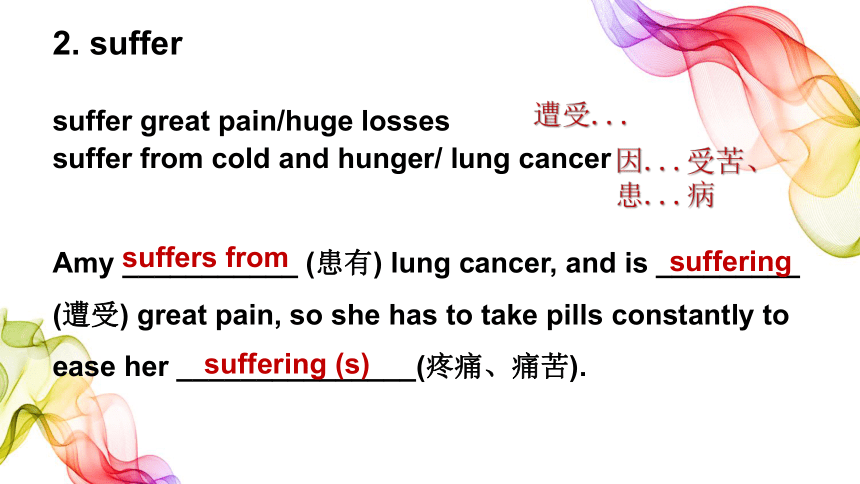
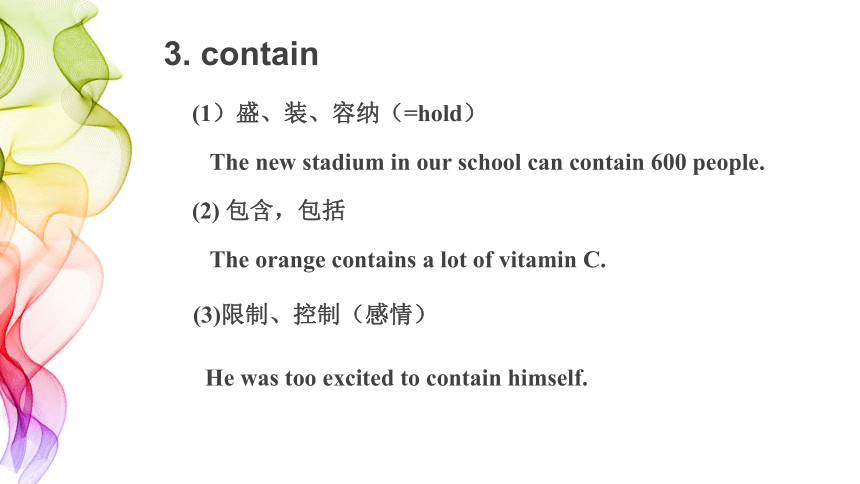
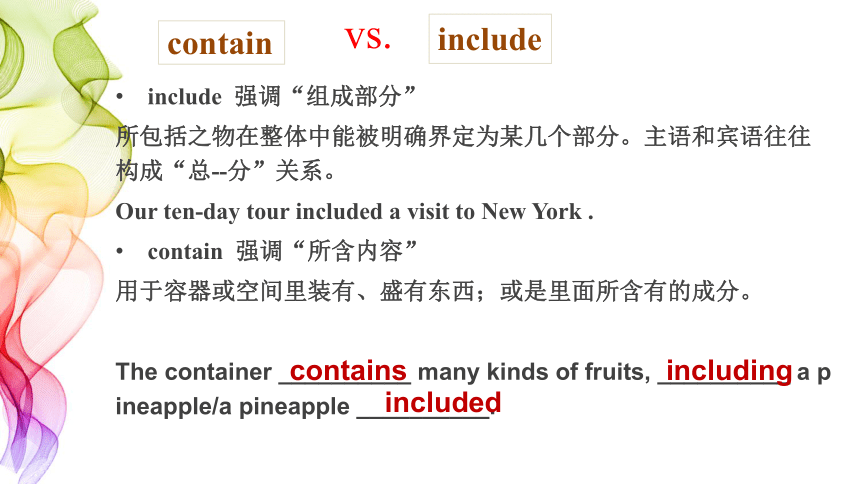
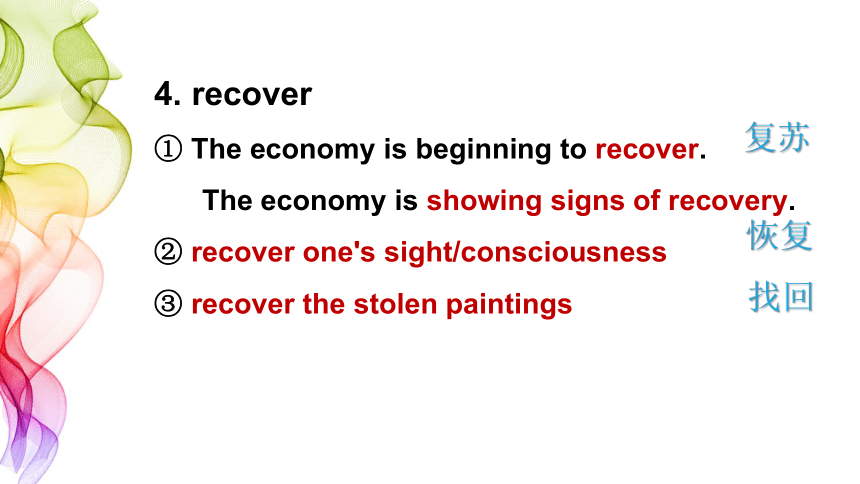
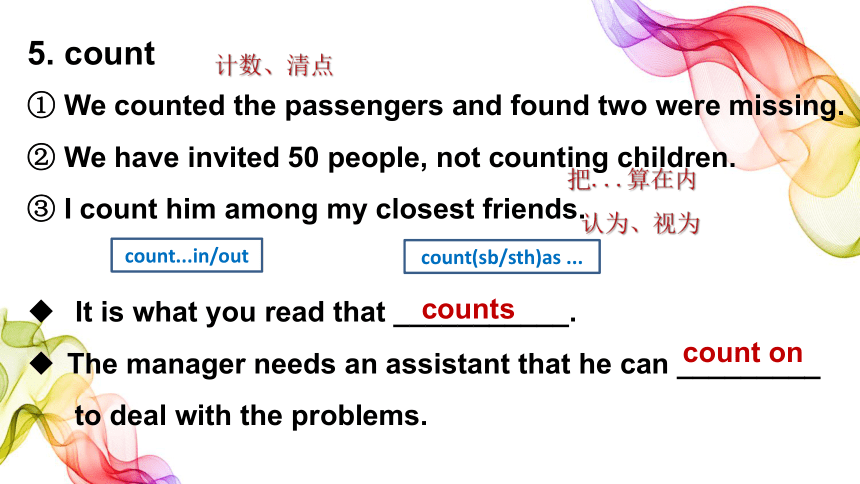
文档简介
(共29张PPT)
Module 1 Unit 3
复习
English
1. recover (n.)
2. prefer (n.)
3. fail (n.)
4. chemical (n.)
5. achieve (n.)
6. treat (n.)
7. equip (n.)
8. concentrate (n.)
9. system (adj.)
10. pain (adj.)
11. athlete (adj.)
12. include (prep.)
Part 1重点单词
recovery
preference
failure
chemistry
achievement
treatment
equipment
concentration
systematic
painful
athletic
including
13. ashamed (n.) (adj.)
14. attract (n.) (adj.)
15. embarrass (n.) (adj.)
16. lose (n.) (adj.)
17. energetic (n.) (adv.)
18. sad (n.) (adv.)
19. effect (v.) (adj.)
20. comfortable (n.) (adv.)
21. peace (adj.) (adv.)
22. use (adj.) (adj.)
shame
shameful
attraction
attractive
embarrassment
embarrassed/-ing
loss
lost
energy
energetically
sadness
sadly
affect
effective
comfort
comfortably
peaceful
peacefully
useful
useless
be/feel ashamed of sb/sth ...
be/feel ashamed that ...
1. ashamed
① It is surprising that she should have the
ashamed behavior.
② What a shame/It is a shame that he wasn't here to see it.
alone, asleep, awake, aware, alive 不做定语
ashamed
Amy ___________ (患有) lung cancer, and is _________(遭受) great pain, so she has to take pills constantly to ease her _______________(疼痛、痛苦).
2. suffer
suffer great pain/huge losses
suffer from cold and hunger/ lung cancer
遭受...
因...受苦、患...病
suffers from
suffering
suffering (s)
3. contain
(1)盛、装、容纳(=hold)
The new stadium in our school can contain 600 people.
(2) 包含,包括
The orange contains a lot of vitamin C.
(3)限制、控制(感情)
He was too excited to contain himself.
include 强调“组成部分”
所包括之物在整体中能被明确界定为某几个部分。主语和宾语往往构成“总--分”关系。
Our ten-day tour included a visit to New York .
contain 强调“所含内容”
用于容器或空间里装有、盛有东西;或是里面所含有的成分。
The container __________ many kinds of fruits, __________ a pineapple/a pineapple __________.
contain
vs.
include
contains
including
included
4. recover
① The economy is beginning to recover.
The economy is showing signs of recovery.
② recover one's sight/consciousness
③ recover the stolen paintings
复苏
恢复
找回
5. count
① We counted the passengers and found two were missing.
② We have invited 50 people, not counting children.
③ I count him among my closest friends.
It is what you read that ___________.
The manager needs an assistant that he can _________
to deal with the problems.
计数、清点
把...算在内
认为、视为
count...in/out
count(sb/sth)as ...
counts
count on
6. prefer
preferred preferring
prefer sth.
prefer to do sth.
prefer A to B
prefer doing A to doing B
prefer to do A rather than do B
preference
show preference for 偏爱
【n.】
7. figure
(1) 体形、体态
She works out regularly to keep a slim figure.
(2) 数字
All these figures add up to 100.
(3) 大人物,名人
Several leading figures will attend the assembly to be held tomorrow.
(4) 人影,轮廓
At the sight of the tall figure, the girl was frightened.
(5) figure out
I can’t figure out the reason why she said so.
8. effect
side effect 副作用
have a …effect on / upon sb./sth.
take effect
come into effect
effective
take effective measures / steps to do sth.
实施、生效
affect
1. 影响
His decision will greatly affect his future life.
2. 使感动(多用被动)
He was deeply affected by the love story.
3. 使感染(疾病)
Apply the cream to the affected area.
【vt.】
1. work out
He works out at the gym three times a week.
The poor boy cannot work out the difficult maths problem.
We are trying to work out a plan to have a cheaper holiday.
I can’t work out the meaning of the poem.
锻炼
计算出
制定
理解,弄懂
Part 2 重点短语
Things just didn't work out as planned.
发生、进展
Part 2 重点短语
2. fall out (fell-fallen)
① It is surprising you should _______ (上当) his trick.
② They fell for each other instantly.
③ She soon __________ (落后) the leader.
④ The full cost of the wedding fell on the parents.
⑤ I rushed to the door and fell over the cat
in the hallway.
fall for
爱上
fell behind
落在...身上;由...负担
trip over 被...绊倒
Part 3 重点句型
However, your mother knows best: nothing is more important
than health.
① 他从未看过比这更激动人心的足球比赛。
He has never seen a more exciting football match.
② 过马路时无论如何小心都不为过。
否定词+adj./adv.比较级:最高级
You cannot be more careful when crossing the road.
2. Walking and riding your bike count, and so do school sports.
so + 助动词 +sb/sth ...也是如此(肯定)
neither/nor+助动词+sb/sth,(否定)
① I work out every morning. ________________
(我姐姐也一样)。
② Bill was not happy about the delay of the report, and ____________
(我也一样)
So does my sister .
neither was I.
③ She was born in Nanjing and studied in Peking University,
and ___________________________________________
(她的丈夫也一样).
④ --Amy has got to know the harm of the weight-loss pills to health.
-- ____________(她确实知道了), and _________ her mother(她母亲也已知道).
so it was with/it was the same with her husband
so + sb/sth + 助动词 ...确实如此
So she has
so has
Part 4 重点语法-反意疑问
前肯后否,前否后肯
[基本原则]
[注意]
1. 否定词出现(hardly, scarcely, rarely, few, little, no, never...),反意疑问用肯定;否定前缀出现,但谓语是肯定,反意疑问用否定。
① He was seldom late, ________?
② It is impossible for him to make such a mistake,
___________?
was he
isn't it
2. 反意疑问主语
everyone/everybody/someone/somebody/no one/
nobody/anyone/anybody
everything/anything/something/nothing
to do/ doing
they/he
it
it
① Nobody likes to be laughed at, _______________?
② Something has gone wrong with the machine, ________?
③ Learning English well takes us a lot of time, _________?
does he/ do they
hasn't it
doesn't it
3. 主句or宾从?一般情况,针对主句提问;
如主句部分为I think/suppose/believe/imagine that;
I' m sure/afraid that ...,对宾从提问,注意否定前移。
① Tom doesn't believe Jane will succeed,__________?
② I don't think you have heard of him before,_________?
does he
have you
4. 陈述部分为祈使句
肯定祈使句, will/won't you?
否定祈使句, will you?
Let's ..., shall we?
Let us..., will/won't you?
5. 对推测提问,还原为本质句,再反意提问。
① He must be working on the laptop now, ___________?
He is working on the laptop now.
② The light is out in the office. The teachers must have gone home, ______________?
...The teachers have gone home.
③ You must have watched the football match last night, ___________?
You watched the football match last night.
isn't he
haven't they
didn't you
6. 回答反意疑问句:
事实肯定,用yes; 事实否定,用no;
答语前后一致。
④ --You aren't a teacher, are you?
-- ______________(不,我是。)/
-- _______________ (是的,我不是。)
Yes, I am.
No, I am not.
非限制性定语从句
1. 形式
逗号 在非限制性定语从句的前面往往有逗号隔开,如果把非限制性定语从句放在句子中间,其前后都要用逗号与主句隔开。
2. 作用
补充附带说明 与主语的关系不像限制性定语从句的关系那样密切,缺少它也不会影响全句的理解。
非限制性定语从句
3. 引导词
that, why不能引导非限制性定语从句。
4. 指代对象
名词、代词或者句子一部分,甚至整个主句内容
非限制性定语从句
Charles Smith, _____ was my former teacher, retired last year.
You’ve made many mistakes, ___________ were due to your carelessness.
He will put off the picnic until May 1st, _____ he will be free.
They went to London,______ they lived for six months.
who
most of which
when
where
非限制性定语从句(which VS as)
He said that he had never seen her before,______ was not true.
He forgot to bring his pen with him, ______ was often the case.
_____ we had expected, he gave a wonderful performance.
They cut down the tree, ______ was planted last year.
Two people were seriously injured in the accident, ______ is reported in the newspaper.
which
as
As
which
as
Thank you!
Module 1 Unit 3
复习
English
1. recover (n.)
2. prefer (n.)
3. fail (n.)
4. chemical (n.)
5. achieve (n.)
6. treat (n.)
7. equip (n.)
8. concentrate (n.)
9. system (adj.)
10. pain (adj.)
11. athlete (adj.)
12. include (prep.)
Part 1重点单词
recovery
preference
failure
chemistry
achievement
treatment
equipment
concentration
systematic
painful
athletic
including
13. ashamed (n.) (adj.)
14. attract (n.) (adj.)
15. embarrass (n.) (adj.)
16. lose (n.) (adj.)
17. energetic (n.) (adv.)
18. sad (n.) (adv.)
19. effect (v.) (adj.)
20. comfortable (n.) (adv.)
21. peace (adj.) (adv.)
22. use (adj.) (adj.)
shame
shameful
attraction
attractive
embarrassment
embarrassed/-ing
loss
lost
energy
energetically
sadness
sadly
affect
effective
comfort
comfortably
peaceful
peacefully
useful
useless
be/feel ashamed of sb/sth ...
be/feel ashamed that ...
1. ashamed
① It is surprising that she should have the
ashamed behavior.
② What a shame/It is a shame that he wasn't here to see it.
alone, asleep, awake, aware, alive 不做定语
ashamed
Amy ___________ (患有) lung cancer, and is _________(遭受) great pain, so she has to take pills constantly to ease her _______________(疼痛、痛苦).
2. suffer
suffer great pain/huge losses
suffer from cold and hunger/ lung cancer
遭受...
因...受苦、患...病
suffers from
suffering
suffering (s)
3. contain
(1)盛、装、容纳(=hold)
The new stadium in our school can contain 600 people.
(2) 包含,包括
The orange contains a lot of vitamin C.
(3)限制、控制(感情)
He was too excited to contain himself.
include 强调“组成部分”
所包括之物在整体中能被明确界定为某几个部分。主语和宾语往往构成“总--分”关系。
Our ten-day tour included a visit to New York .
contain 强调“所含内容”
用于容器或空间里装有、盛有东西;或是里面所含有的成分。
The container __________ many kinds of fruits, __________ a pineapple/a pineapple __________.
contain
vs.
include
contains
including
included
4. recover
① The economy is beginning to recover.
The economy is showing signs of recovery.
② recover one's sight/consciousness
③ recover the stolen paintings
复苏
恢复
找回
5. count
① We counted the passengers and found two were missing.
② We have invited 50 people, not counting children.
③ I count him among my closest friends.
It is what you read that ___________.
The manager needs an assistant that he can _________
to deal with the problems.
计数、清点
把...算在内
认为、视为
count...in/out
count(sb/sth)as ...
counts
count on
6. prefer
preferred preferring
prefer sth.
prefer to do sth.
prefer A to B
prefer doing A to doing B
prefer to do A rather than do B
preference
show preference for 偏爱
【n.】
7. figure
(1) 体形、体态
She works out regularly to keep a slim figure.
(2) 数字
All these figures add up to 100.
(3) 大人物,名人
Several leading figures will attend the assembly to be held tomorrow.
(4) 人影,轮廓
At the sight of the tall figure, the girl was frightened.
(5) figure out
I can’t figure out the reason why she said so.
8. effect
side effect 副作用
have a …effect on / upon sb./sth.
take effect
come into effect
effective
take effective measures / steps to do sth.
实施、生效
affect
1. 影响
His decision will greatly affect his future life.
2. 使感动(多用被动)
He was deeply affected by the love story.
3. 使感染(疾病)
Apply the cream to the affected area.
【vt.】
1. work out
He works out at the gym three times a week.
The poor boy cannot work out the difficult maths problem.
We are trying to work out a plan to have a cheaper holiday.
I can’t work out the meaning of the poem.
锻炼
计算出
制定
理解,弄懂
Part 2 重点短语
Things just didn't work out as planned.
发生、进展
Part 2 重点短语
2. fall out (fell-fallen)
① It is surprising you should _______ (上当) his trick.
② They fell for each other instantly.
③ She soon __________ (落后) the leader.
④ The full cost of the wedding fell on the parents.
⑤ I rushed to the door and fell over the cat
in the hallway.
fall for
爱上
fell behind
落在...身上;由...负担
trip over 被...绊倒
Part 3 重点句型
However, your mother knows best: nothing is more important
than health.
① 他从未看过比这更激动人心的足球比赛。
He has never seen a more exciting football match.
② 过马路时无论如何小心都不为过。
否定词+adj./adv.比较级:最高级
You cannot be more careful when crossing the road.
2. Walking and riding your bike count, and so do school sports.
so + 助动词 +sb/sth ...也是如此(肯定)
neither/nor+助动词+sb/sth,(否定)
① I work out every morning. ________________
(我姐姐也一样)。
② Bill was not happy about the delay of the report, and ____________
(我也一样)
So does my sister .
neither was I.
③ She was born in Nanjing and studied in Peking University,
and ___________________________________________
(她的丈夫也一样).
④ --Amy has got to know the harm of the weight-loss pills to health.
-- ____________(她确实知道了), and _________ her mother(她母亲也已知道).
so it was with/it was the same with her husband
so + sb/sth + 助动词 ...确实如此
So she has
so has
Part 4 重点语法-反意疑问
前肯后否,前否后肯
[基本原则]
[注意]
1. 否定词出现(hardly, scarcely, rarely, few, little, no, never...),反意疑问用肯定;否定前缀出现,但谓语是肯定,反意疑问用否定。
① He was seldom late, ________?
② It is impossible for him to make such a mistake,
___________?
was he
isn't it
2. 反意疑问主语
everyone/everybody/someone/somebody/no one/
nobody/anyone/anybody
everything/anything/something/nothing
to do/ doing
they/he
it
it
① Nobody likes to be laughed at, _______________?
② Something has gone wrong with the machine, ________?
③ Learning English well takes us a lot of time, _________?
does he/ do they
hasn't it
doesn't it
3. 主句or宾从?一般情况,针对主句提问;
如主句部分为I think/suppose/believe/imagine that;
I' m sure/afraid that ...,对宾从提问,注意否定前移。
① Tom doesn't believe Jane will succeed,__________?
② I don't think you have heard of him before,_________?
does he
have you
4. 陈述部分为祈使句
肯定祈使句, will/won't you?
否定祈使句, will you?
Let's ..., shall we?
Let us..., will/won't you?
5. 对推测提问,还原为本质句,再反意提问。
① He must be working on the laptop now, ___________?
He is working on the laptop now.
② The light is out in the office. The teachers must have gone home, ______________?
...The teachers have gone home.
③ You must have watched the football match last night, ___________?
You watched the football match last night.
isn't he
haven't they
didn't you
6. 回答反意疑问句:
事实肯定,用yes; 事实否定,用no;
答语前后一致。
④ --You aren't a teacher, are you?
-- ______________(不,我是。)/
-- _______________ (是的,我不是。)
Yes, I am.
No, I am not.
非限制性定语从句
1. 形式
逗号 在非限制性定语从句的前面往往有逗号隔开,如果把非限制性定语从句放在句子中间,其前后都要用逗号与主句隔开。
2. 作用
补充附带说明 与主语的关系不像限制性定语从句的关系那样密切,缺少它也不会影响全句的理解。
非限制性定语从句
3. 引导词
that, why不能引导非限制性定语从句。
4. 指代对象
名词、代词或者句子一部分,甚至整个主句内容
非限制性定语从句
Charles Smith, _____ was my former teacher, retired last year.
You’ve made many mistakes, ___________ were due to your carelessness.
He will put off the picnic until May 1st, _____ he will be free.
They went to London,______ they lived for six months.
who
most of which
when
where
非限制性定语从句(which VS as)
He said that he had never seen her before,______ was not true.
He forgot to bring his pen with him, ______ was often the case.
_____ we had expected, he gave a wonderful performance.
They cut down the tree, ______ was planted last year.
Two people were seriously injured in the accident, ______ is reported in the newspaper.
which
as
As
which
as
Thank you!
